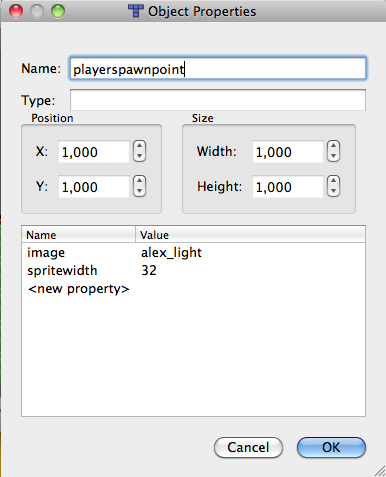ObjectPool
class ObjectPoolObject pooling - a technique that might speed up your game if used properly.
If some of your classes will be instantiated and removed a lot at a time, it is a
good idea to add the class to this object pool. A separate pool for that class
will be created, which will reuse objects of the class. That way they won't be instantiated
each time you need a new one (slowing your game), but stored into that pool and taking one
already instantiated when you need it.
This technique is also used by the engine to instantiate objects defined in the map,
which means, that on level loading the engine will try to instantiate every object
found in the map, based on the user defined name in each Object Properties

Summary
Methods from ObjectPool
Public Methods
exists(name: string) → {boolean}Check if an object with the provided name is registered
| Name | Type | Description |
|---|---|---|
| name | string |
of the registered object class |
| Type | Description |
|---|---|
| boolean |
true if the classname is registered |
getInstanceCount() → {number}returns the amount of object instance currently in the pool
| Type | Description |
|---|---|
| number |
amount of object instance |
poolable(obj: object) → {boolean}Check if an object is poolable (was properly registered with the recycling feature enable)
if (!me.pool.poolable(myCherryEntity)) {
// object was not properly registered
}| Name | Type | Description |
|---|---|---|
| obj | object |
object to be checked |
| Type | Description |
|---|---|
| boolean |
true if the object is poolable |
pull(name: string, args: unknown) → {object}Pull a new instance of the requested object (if added into the object pool)
me.pool.register("bullet", BulletEntity, true);
me.pool.register("enemy", EnemyEntity, true);
// ...
// when we need to manually create a new bullet:
let bullet = me.pool.pull("bullet", x, y, direction);
// ...
// params aren't a fixed number
// when we need new enemy we can add more params, that the object construct requires:
let enemy = me.pool.pull("enemy", x, y, direction, speed, power, life);
// ...
// when we want to destroy existing object, the remove
// function will ensure the object can then be reallocated later
me.game.world.removeChild(enemy);
me.game.world.removeChild(bullet);| Name | Type | Attributes | Description |
|---|---|---|---|
| name | string |
as used in pool.register |
|
| args | unknown |
<optional> |
arguments to be passed when instantiating/reinitializing the object |
| Type | Description |
|---|---|
| object |
the instance of the requested object |
purge() → {}purge the object pool from any inactive object
Object pooling must be enabled for this function to work
note: this will trigger the garbage collector
push(obj: object, throwOnError: boolean) → {boolean}Push back an object instance into the object pool
Object pooling for the object class must be enabled,
and object must have been instantiated using pool#pull,
otherwise this function won't work
| Name | Type | Attributes | Default | Description |
|---|---|---|---|---|
| obj | object |
instance to be recycled |
||
| throwOnError | boolean |
<optional> |
true |
throw an exception if the object cannot be recycled |
| Type | Description |
|---|---|
| boolean |
true if the object was successfully recycled in the object pool |
register(className: string, classObj: object, recycling: boolean) → {}register an object to the pool.
Pooling must be set to true if more than one such objects will be created.
(Note: for an object to be poolable, it must implements a onResetEvent method)
// implement CherryEntity
class Cherry extends Sprite {
onResetEvent() {
// reset object mutable properties
this.lifeBar = 100;
}
};
// add our users defined entities in the object pool and enable object recycling
me.pool.register("cherrysprite", Cherry, true);| Name | Type | Attributes | Default | Description |
|---|---|---|---|---|
| className | string |
as defined in the Name field of the Object Properties (in Tiled) |
||
| classObj | object |
corresponding Class to be instantiated |
||
| recycling | boolean |
<optional> |
false |
enables object recycling for the specified class |